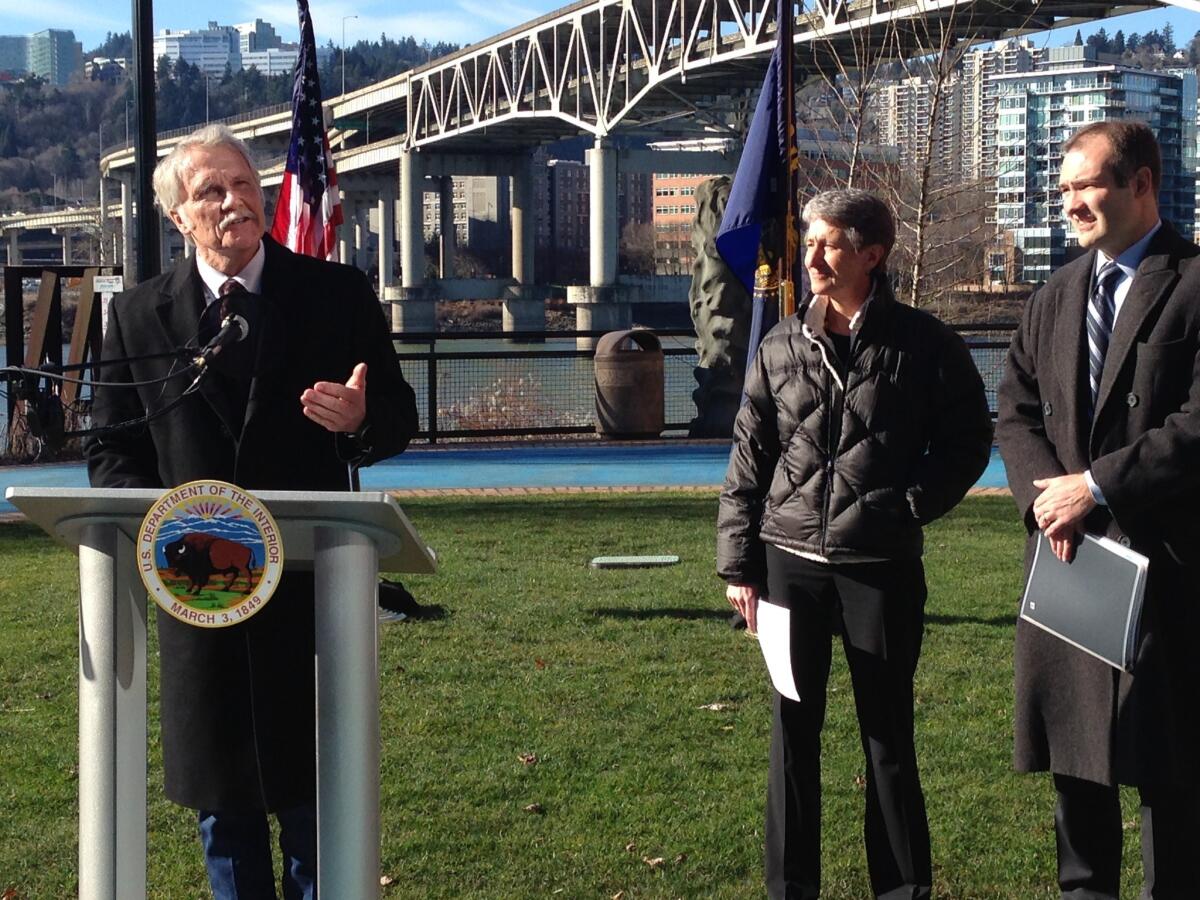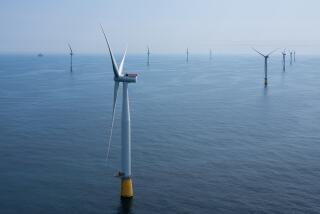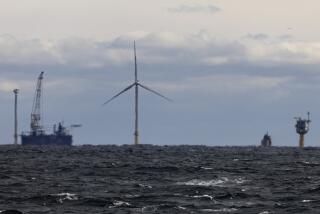Winds of change: Floating power turbines envisioned off Oregon coast

- Share via
A Seattle energy company received initial regulatory approval Wednesday to build five massive wind turbines floating 16 miles off the Oregon coast.
The pilot project off Coos Bay would be the first offshore wind facility on the West Coast. It also would be the biggest demonstration of technology that places floating turbines on platforms in deep water, according to federal officials and executives at Principle Power, the developer.
The turbines would be as tall as a 60-story building, vastly larger than typical turbines on land-based wind farms, and able to tap strong ocean winds that blow consistently in southern Oregon, said Kevin Banister, Principle’s vice president for business and government affairs.
Each 6-megawatt turbine would be supported on three floating platforms moored by cables anchored to the sea floor, about 1,400 feet below the surface. The electricity would be transmitted to shore via underwater cable.
The Bureau of Ocean Energy Management, Regulation and Enforcement, part of the Interior Department, gave approval for the company to submit a formal plan for building the 30-megawatt project. Principle Power would lease 15 square miles of ocean away from shipping lanes and barely visible from the coast.
Interior Secretary Sally Jewell and Democratic Gov. John Kitzhaber announced the project Wednesday in Oregon, invoking the Obama administration’s vision for clean energy and reducing carbon pollution.
Banister said the venture would cost about $200 million and was expected to be operational by 2017. It has received $4 million in Energy Department funding as an advanced demonstration project. Principle hopes to reach a power purchase agreement with Oregon utilities.
Approval for the lease application followed a process to ensure there was no competitive interest from other parties in the 15 square miles of ocean that Principle would have access to. The company still must go through a complex federal regulatory approval process under the National Environmental Protection Act, said Doug Boren, the bureau’s renewable energy manager for the West Coast.
“It is a relatively new technology that the Department of Energy is interested in funding,” he said.
The Energy Department’s National Renewable Energy Laboratory has estimated that the West Coast has 800 gigawatts of wind energy potential, equal to more than three-fourths of the nation’s entire power generation capacity. Banister said the company’s research has determined that southern Oregon and Northern California have some of the strongest and most consistent winds, along with parts of Southern California.
“Offshore wind in the right locations is a very promising technology,” said Bill Corcoran, the Sierra Club’s western director for its Beyond Coal campaign.
Banister said the company’s studies indicate that the turbines will produce about 40% of their maximum potential generating capacity, significantly above the 20% to low 30% that is typical on land-based California wind farms. The best wind farms planned for Wyoming are expected to product at 45% capacity.
Boren and other wind experts say the economic feasibility of generating power offshore still needs to be determined. Only three wind turbines operate on floating platforms, including one in Portugal that Principle built for research.
The Portugal turbine has given the company confidence that it can engineer floating platforms that will remain stable in major storms, Banister said.
“It has gone through 50-foot waves and performed through those conditions,” he said.
ALSO:
Seattle goes crazy in Seahawks victory celebration
California drought: House GOP takes aim at water rules
Snow, ice wreak havoc in Northeast as another storm blows in
, Regulation and Enforcement
More to Read
Sign up for Essential California
The most important California stories and recommendations in your inbox every morning.
You may occasionally receive promotional content from the Los Angeles Times.











